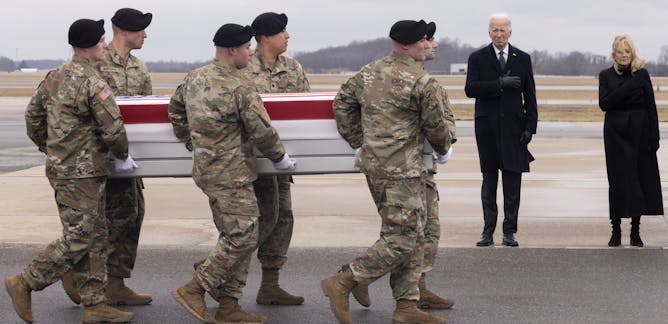US' renewed airstrikes in Syria, Iraq not to deter Iran Crisis new divide
The deadly drone attack conducted by the Iranian-backed militant groups on January 28 against the U.S. troops stationed in the Middle East dramatically heightened regional tensions, sparking the risks of igniting the standoff. An umbrella group for Iranian-backed militias, the Islamic Resistance in Iraq, has claimed responsibility for the attack.
Following the human casualties among the U.S. military contingent, the Pentagon ordered to conduct a series of retaliatory attacks against Islamic Resistance of Iraq, another major pro-Iranian militant group, in seven sites in Syria and Iraq, marking a sharp escalation of the war in the Middle East that the Biden administration has for four months sought to avoid.
The decision came amid heated debates in the White House on whether to conduct precise strikes on Iranian territories as retaliation or limit the scope of attacks to avoid a wider conflict. President Joe Biden seems reluctant to give the green light to the military for air strikes on Iranian soil as Tehran stated that it will not hesitate to respond if such strikes occur. However, the U.S. military pushes the Biden administration to take strict measures against Iran in addition to air raids of Syrian and Iraqi territories.
The goal is to ensure the U.S. degrades the groups' capabilities to attack American troops and facilities while sending a "strong signal to their backers" in Iran's Islamic Revolutionary Guard Corps. Consequently, the frustration of the U.S. regarding the deadly drone attack stirred fears among pro-Iranian militant groups, resulting in Kataib Hezbollah’s decision to suspend all further attacks against the U.S. "in order to prevent the embarrassment of the Iraqi government." Kataib Hezbollah’s announcement did not mention any threat of an American response. But the timing is no coincidence.
Indeed, the U.S. strikes in Iraq and Syria conveyed several messages. Primarily, no attack resulting in the loss of U.S. military personnel will remain without a strong response. The United States may absorb certain attacks that leave damaged infrastructure, but American lives remain a clear red line. Amid the ongoing Israel-Hamas war, Iran significantly prompted its support to regional proxy forces to exert more pressure on Israel and its Western supporters. The most notorious part about this policy is the destructive actions of the Houthi rebels based in Yemen and frequent attacks on commercial vessels.

However, Iran’s support to Houthis in the Red Sea comes at the cost of rising discontent in India and China as both countries use the Suez Canal for trade operations. As such, Iran may gradually turn down the support for Houthis’ violent attacks in the Red Sea to neutralize potential US-led coalition large-scale operations in the region.
Nevertheless, Iran will unlikely downgrade the support to militants in Iraq as it remains a key direction in terms of national interests. In this context, the Islamic Resistance in Iraq acted as a collective term for pro-Tehran Iraqi militias, allowing them to launch attacks under a single banner. Over time, it evolved to become a front for Iran-backed militias operating beyond Iraq, including those in Syria and Lebanon. Undoubtedly, a primary goal for Iran is to inject uncertainty and indecision into U.S. policymaker deliberations as to how hard we should strike Iran, knowing that there are voices in the U.S. and Europe who will seize any opportunity for diplomacy, even if there is little evidence this will succeed.
While tackling the pro-Iranian militants in Iraq and Syria, the U.S. leads the maritime coalition against Houthi rebels in the Red Sea in an effort to alleviate the fragile security, albeit unsuccessfully. The strikes targeted vital assets such as command and control centers, intelligence facilities, storage locations for rockets, missiles, drones, and logistics and munitions facilities. On February 6, Houthi forces conducted another attack on the U.S. commercial vessel in the Red Sea despite warnings from the U.S. and the U.K. governments.
The U.S. air raids and precise attacks on Iranian targets in the Middle East will generate only short-term impact as these measures are insufficient to isolate Iran diplomatically and economically while squeezing its support for regional proxies. The U.S. needs a renewed strategy against Iran to undermine its influence, deter aggressive regional expansion, and avoid further regional escalation as the broader regional dynamics are complex.








